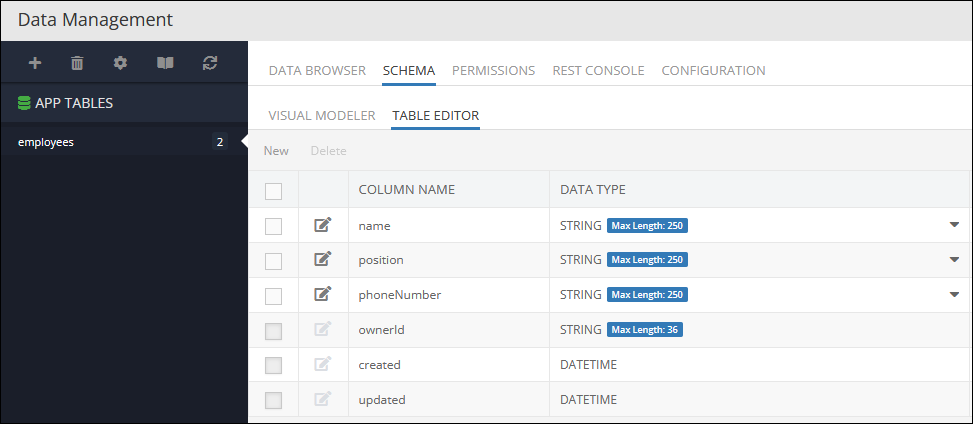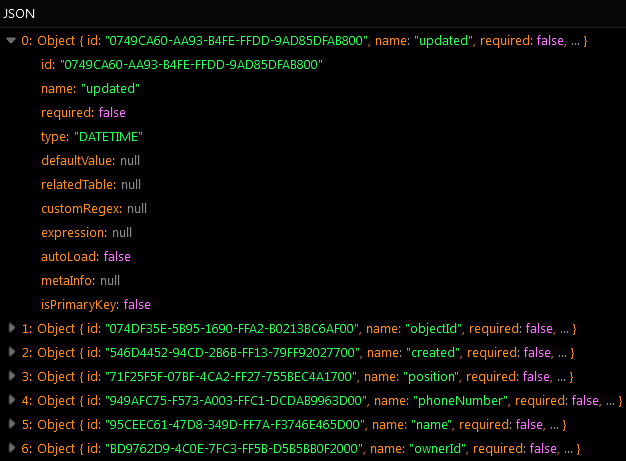Retrieving Schema Definition¶
Backendless provides API for data table schema introspection. The API returns information about table's columns and their data types, whether a value for a column is required or if there is a default value.
- (void)describeWithTableName:(NSString * _Nonnull)tableName responseHandler:^(NSArray<ObjectProperty *> * _Nonnull)responseHandler errorHandler:^(Fault * _Nonnull)errorHandler;
func describe(tableName: String, responseHandler: (([ObjectProperty]) -> Void)! errorHandler: ((Fault) -> Void)!)
where:
| Argument | Description |
|---|---|
tableName |
name of a data table to get the schema for. |
responseHandler |
a block (closure) to handle successful result of an asynchronous call. |
errorHandler |
a block (closure) to handle fault result of an asynchronous call. |
Return value¶
The API returns the array of the ObjectProperty objects. The ObjectProperty protocol has the following properties:
| Argument | Description |
|---|---|
autoLoad |
applies only to relations. If true, the property is set to auto-load related data for the data retrieval queries. |
customRegex |
a regular expression assigned to the column as a validator. The validator applies when a new object is saved in the table or an existing one is updated. |
defaultValue |
a default value assigned to any object saved/updated in the table where the column does not have a value. |
identity |
true if the column is or is a part of a primary key. |
name |
contains the name of a property. |
relatedTable |
contains the name of the related table(s). |
required |
A boolean value defining whether a property is optional or required for the requests which save the initial object or update an existing one. |
type: DataTypeEnum |
defines the column type. |
Example¶
Suppose the Person table has the following schema - there are two developer-defined columns, age and name
The following code retrieves the schema definition for the Person table:
[Backendless.shared.data describeWithTableName:@"Person" responseHandler:^(NSArray<ObjectProperty *> *properties) {
for (ObjectProperty *property in properties) {
NSLog(@"property name - %@", property.name);
NSLog(@" is property required - %s", property.required ? "true" : "false");
NSLog(@" property data type - %@", [property getTypeName]);
NSLog(@" default value - %@", property.defaultValue);
NSLog(@" is property primary key - %s", property.isPrimaryKey ? "true" : "false");
}
} errorHandler:^(Fault *fault) {
NSLog(@"Error: %@", fault.message);
}];
Backendless.shared.data.describe(tableName: "Person", responseHandler: { properties in
for property in properties {
print("property name - \(property.name)")
print(" is property required - \(property.required)")
print(" property data type - \(property.getTypeName())")
print(" default value - \(property.defaultValue ?? NSNull())")
print(" is property primary key - \(property.isPrimaryKey)")
}
}, errorHandler: { fault in
print("Error: \(fault.message ?? "")")
})
The code produces the following output:
property name - objectId
is property required - false
property data type - STRING_ID
default value - null
is property primary key - true
property name - age
is property required - false
property data type - INT
default value - null
is property primary key - false
property name - updated
is property required - false
property data type - DATETIME
default value - null
is property primary key - false
property name - name
is property required - false
property data type - STRING
default value - null
is property primary key - false
property name - created
is property required - false
property data type - DATETIME
default value - null
is property primary key - false
property name - ownerId
is property required - false
property data type - STRING
default value - null
is property primary key - false
Codeless Reference¶

where:
| Argument | Description |
|---|---|
table name |
Name of the data table to get the schema definition for. |
Returns a list containing objects each with the following structure:
{
autoLoad: true or false,
customRegex: value,
defaultValue: null or value,
isPrimaryKey: true or false,
name: value,
relatedTable: null or table name,
required: true or false,
type: data type
}
where:
| Argument | Description |
|---|---|
autoLoad |
Applies only to relations. If true, the property is set to auto-load related data for the data retrieval queries. |
customRegex |
A regular expression assigned to the column as a validator. The validator applies when a new object is saved in the table or an existing one is updated. |
defaultValue |
A default value assigned to any object saved/updated in the table where the column does not have a value. |
isPrimaryKey |
true if the column is or is a part of a primary key. |
name |
Contains the name of a property. |
relatedTable |
Contains the name of the related table. This is applicable only to relation columns. |
required |
Defines whether a property is optional or required for the requests which save the initial object or update an existing one. |
type |
Defines the column type. |
The schema of the data table presented below has three custom columns: name, position, and phoneNumber.
The operation below retrieves the schema of the employees data table.

The result of this operation will look as shown below after the Codeless logic runs. As you can see, the operation returns a list of objects containing detailed information about each column.
